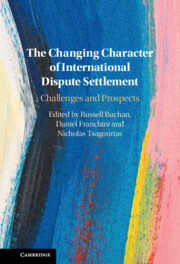Book contents
- The Changing Character of International Dispute Settlement
- The Changing Character of International Dispute Settlement
- Copyright page
- Contents
- Contributors
- Foreword
- Acknowledgements
- Table of Cases
- Table of International Instruments
- Table of Legislation
- Abbreviations
- Introduction
- Part I Recent Trends and Cross-Cutting Issues in International Dispute Settlement
- Part II Effectiveness, Authority, and Legitimacy of the Current System of International Dispute Settlement and Possible Reforms
- 5 Navigating Choppy Waters
- 6 Legitimacy in Settlement of Disputes in International Environmental Law: From Classical to Non-compliance Procedures
- 7 The Role and Legitimacy of International Human Rights Mechanisms of Dispute Settlement
- 8 Settlement of Water-Related Disputes in International Law
- 9 Coherence, Consistency, and the Reform of Investment Treaty Arbitration
- 10 The WTO DSU 2.0
- 11 The Security Council and Impartiality in the Peaceful Settlement of Disputes
- 12 International Criminal Law and the Peaceful Settlement of International Disputes
- Part III New Opportunities and the Future of International Dispute Settlement
- Index
7 - The Role and Legitimacy of International Human Rights Mechanisms of Dispute Settlement
from Part II - Effectiveness, Authority, and Legitimacy of the Current System of International Dispute Settlement and Possible Reforms
Published online by Cambridge University Press: 14 December 2023
- The Changing Character of International Dispute Settlement
- The Changing Character of International Dispute Settlement
- Copyright page
- Contents
- Contributors
- Foreword
- Acknowledgements
- Table of Cases
- Table of International Instruments
- Table of Legislation
- Abbreviations
- Introduction
- Part I Recent Trends and Cross-Cutting Issues in International Dispute Settlement
- Part II Effectiveness, Authority, and Legitimacy of the Current System of International Dispute Settlement and Possible Reforms
- 5 Navigating Choppy Waters
- 6 Legitimacy in Settlement of Disputes in International Environmental Law: From Classical to Non-compliance Procedures
- 7 The Role and Legitimacy of International Human Rights Mechanisms of Dispute Settlement
- 8 Settlement of Water-Related Disputes in International Law
- 9 Coherence, Consistency, and the Reform of Investment Treaty Arbitration
- 10 The WTO DSU 2.0
- 11 The Security Council and Impartiality in the Peaceful Settlement of Disputes
- 12 International Criminal Law and the Peaceful Settlement of International Disputes
- Part III New Opportunities and the Future of International Dispute Settlement
- Index
Summary
In this chapter, Sir Malcolm Evans examines the role and legitimacy of international human rights mechanisms of dispute settlement. This chapter argues that the relationship between international dispute settlement and the work of the United Nations human rights treaty bodies is demonstrated by a series of cases brought by Qatar against the United Arab Emirates before both the International Court of Justice (ICJ) and the UN Committee on the Elimination of Racial Discrimination (CERD). This chapter explores some of the tensions which have been revealed concerning the interplay between the work of the CERD Committee and that of the ICJ and how each responded to them. It notes that the multifaceted and sui generis nature of their work means that they do not operate in a single ‘conceptual space’ and that the nature of the treaty bodies, their role and function, and the environment in which they work need to be borne in mind if their work is to be properly appreciated, understood, and engaged with.
Keywords
- Type
- Chapter
- Information
- The Changing Character of International Dispute SettlementChallenges and Prospects, pp. 184 - 216Publisher: Cambridge University PressPrint publication year: 2023



